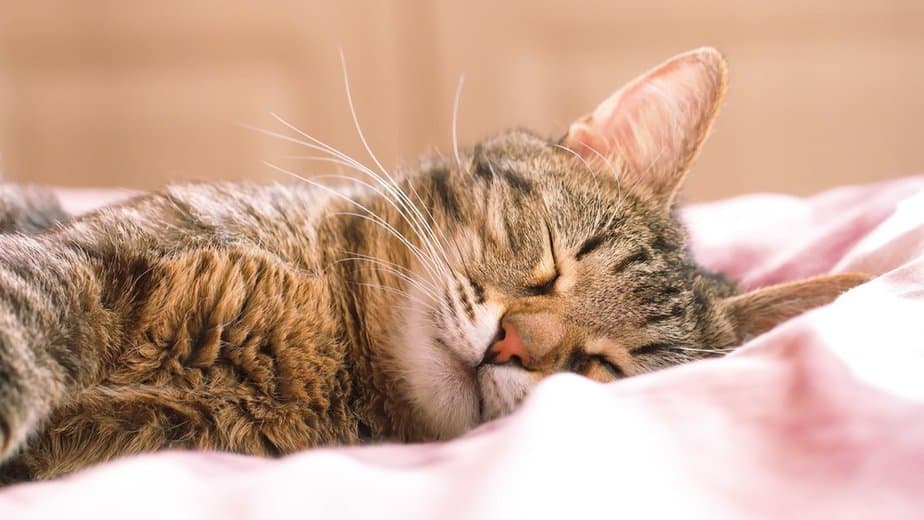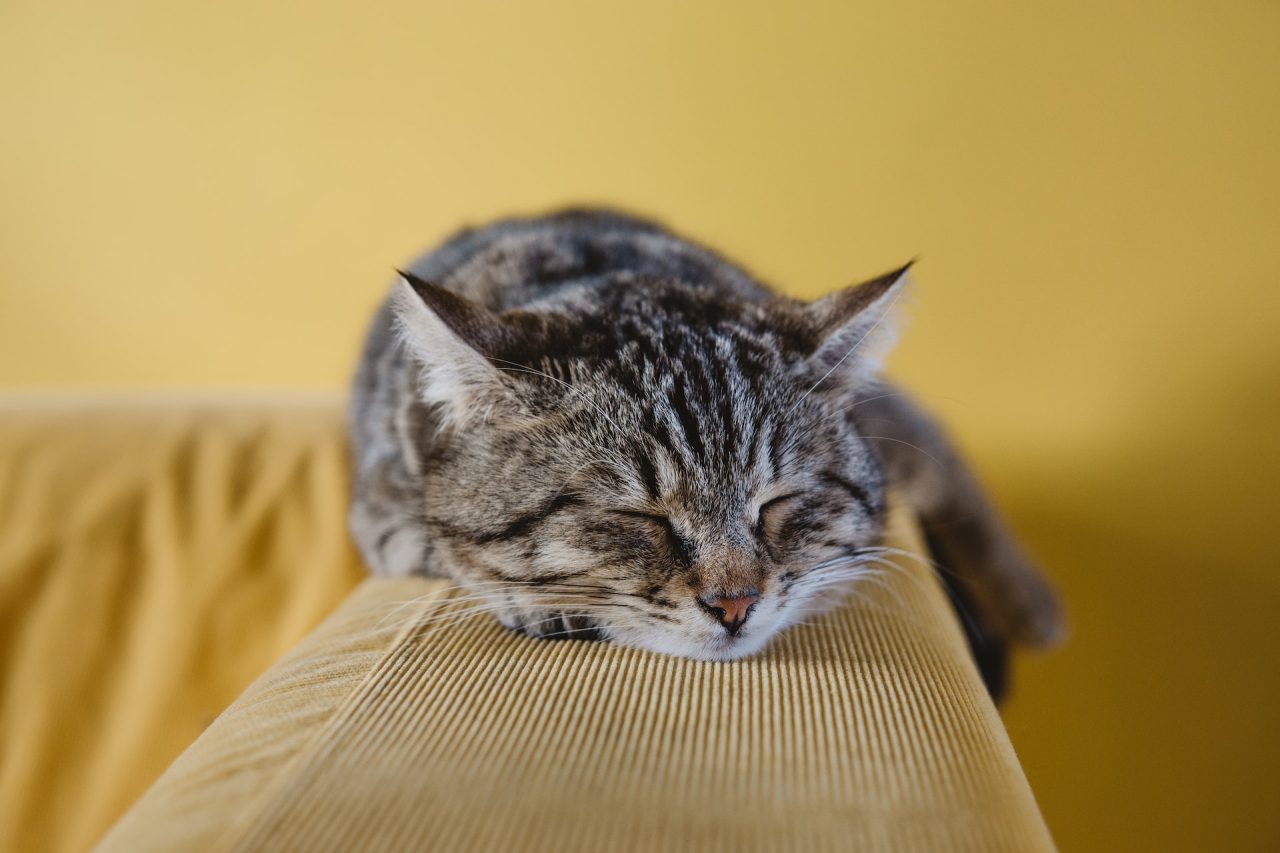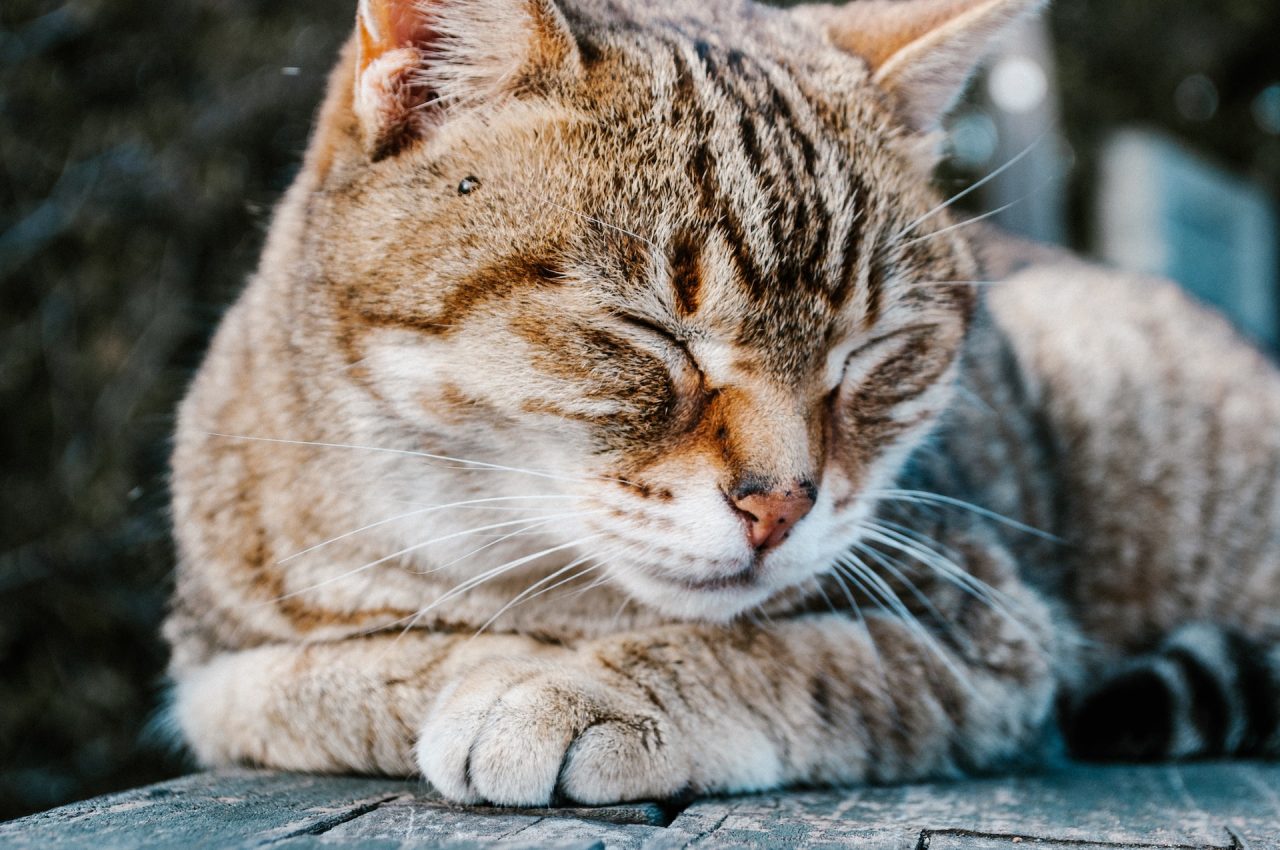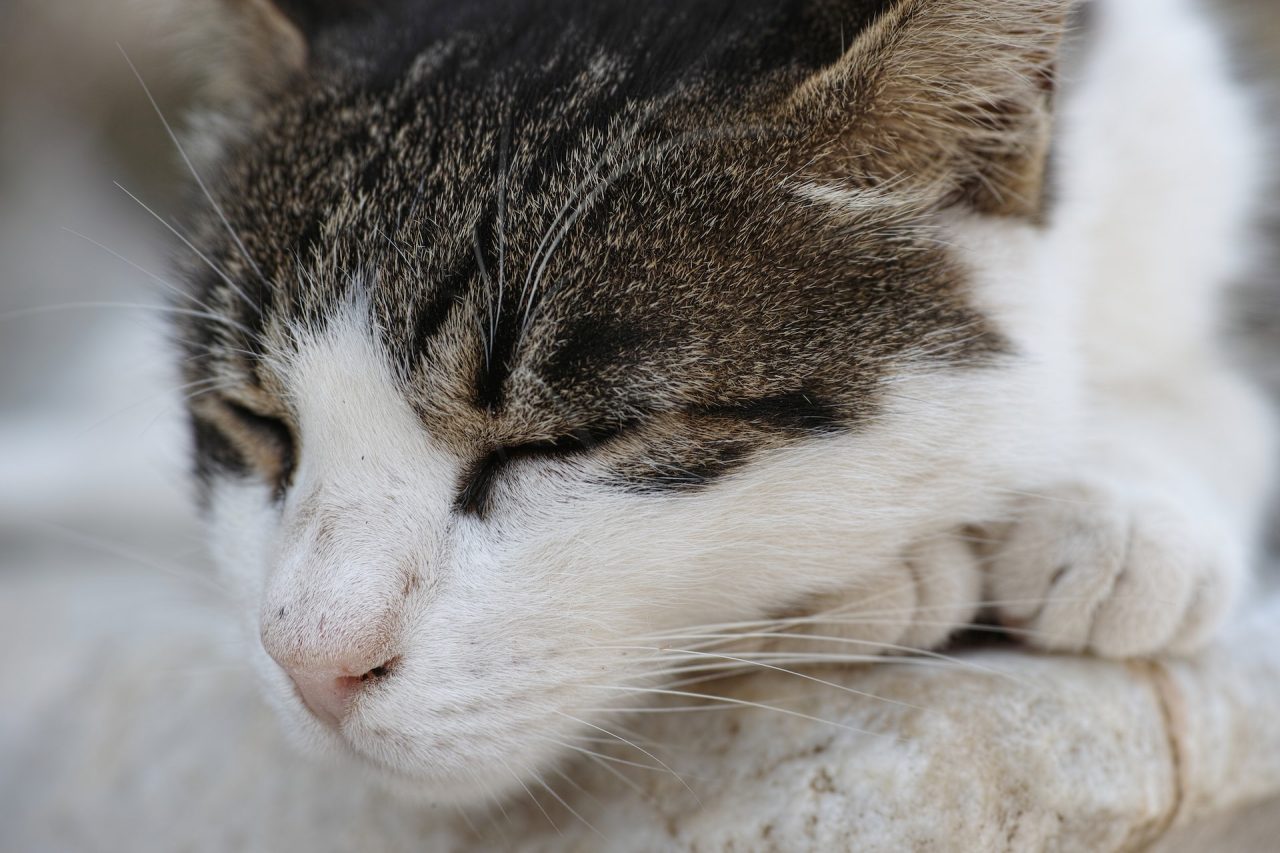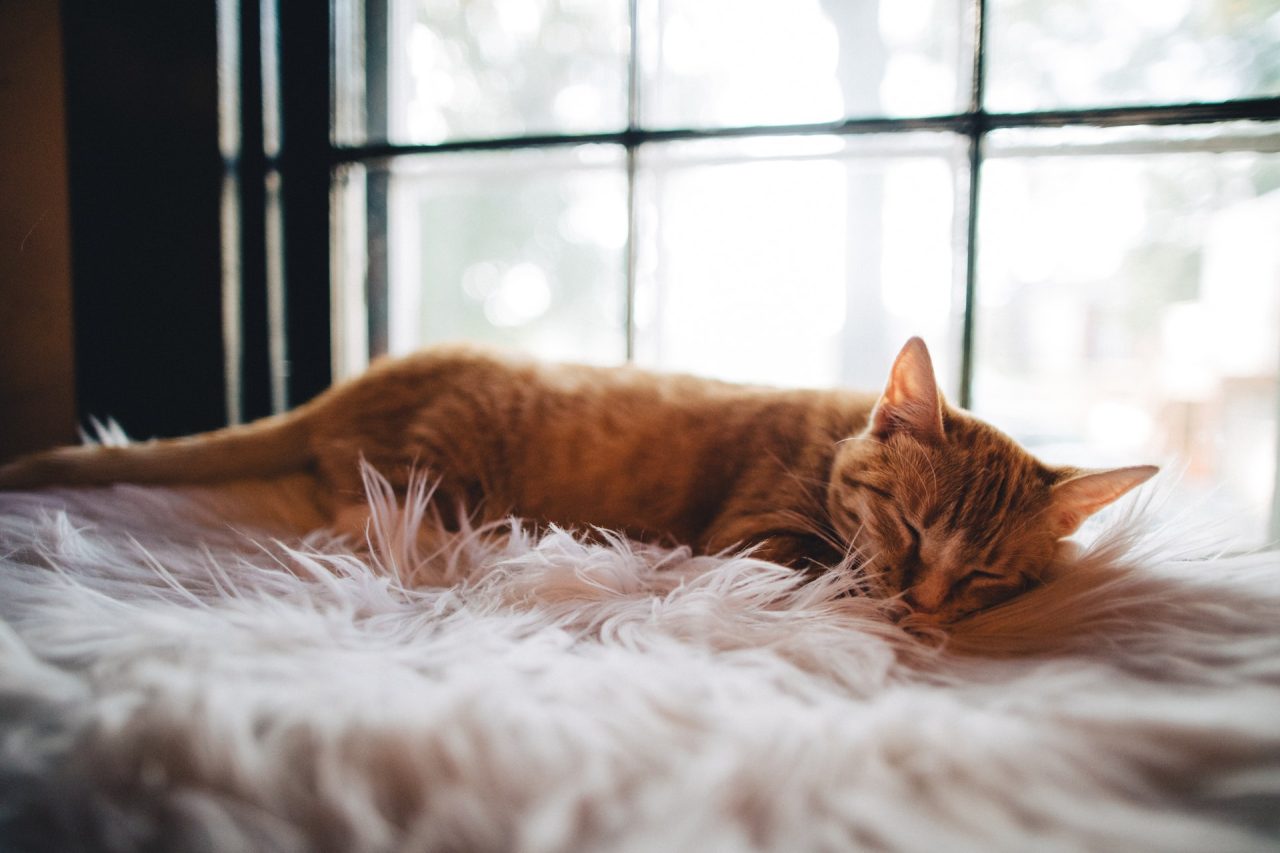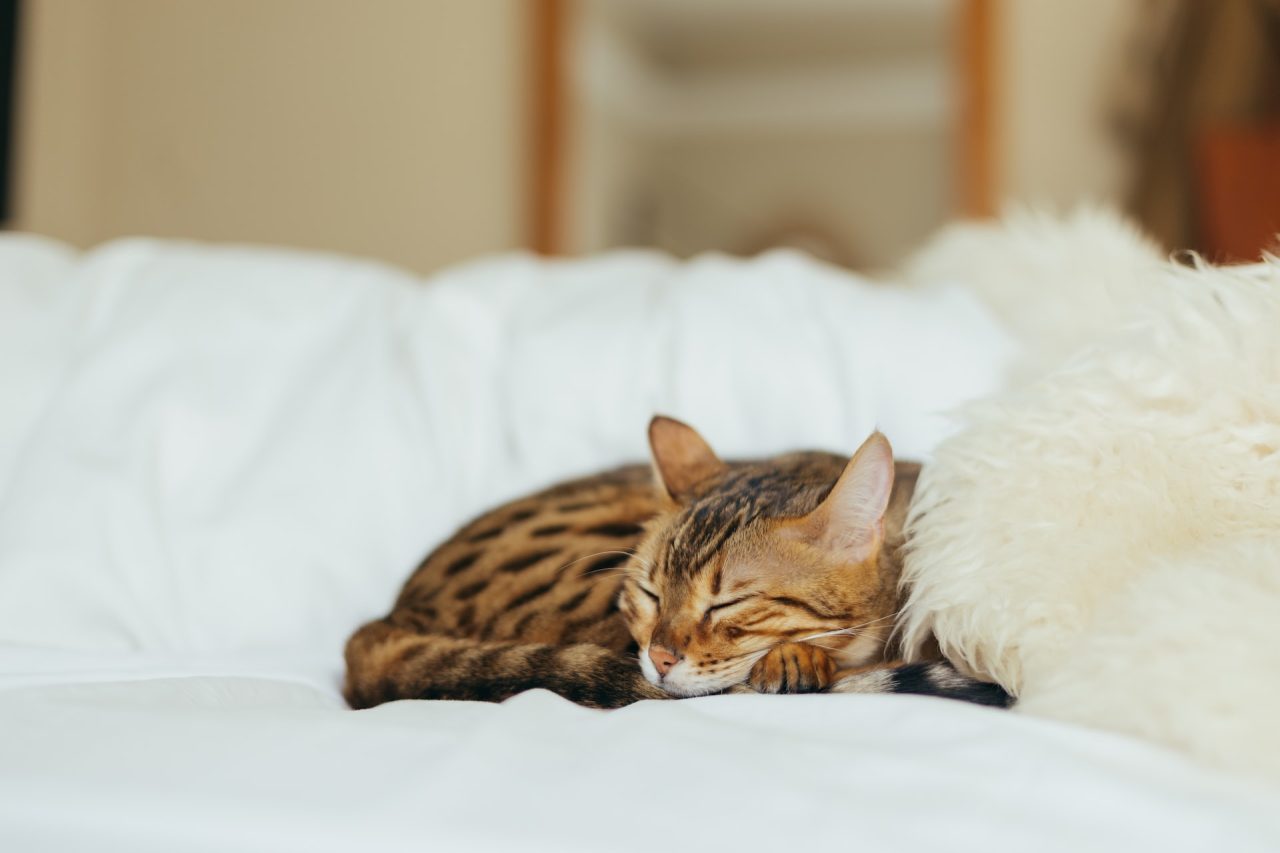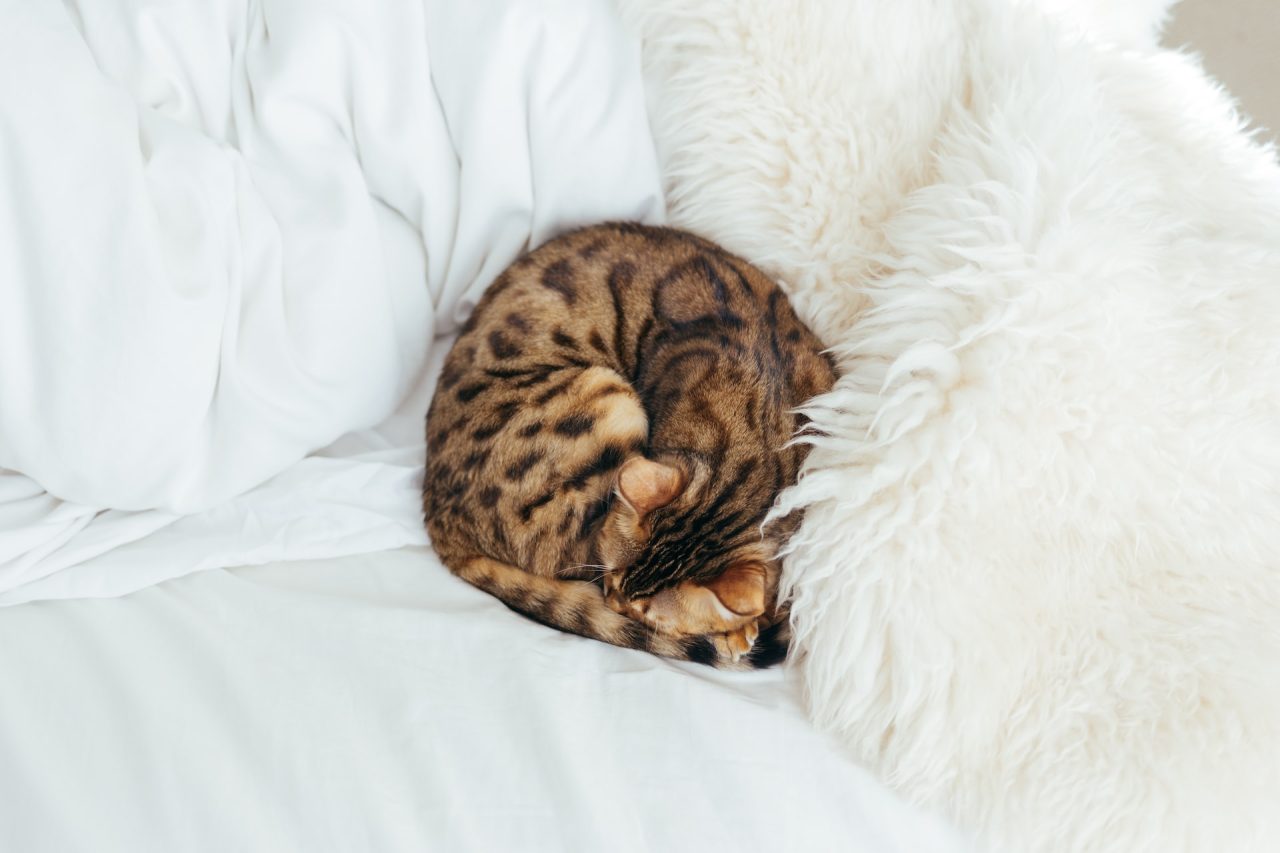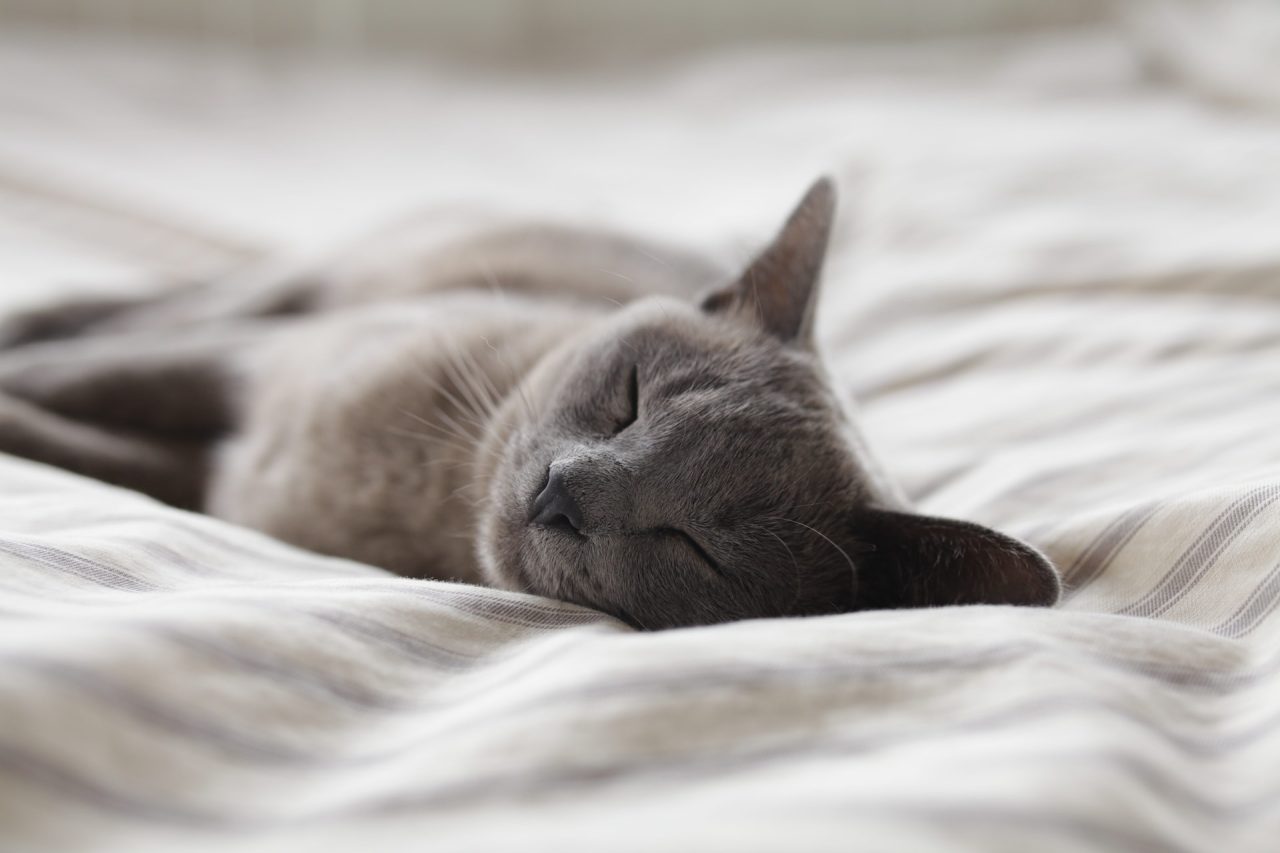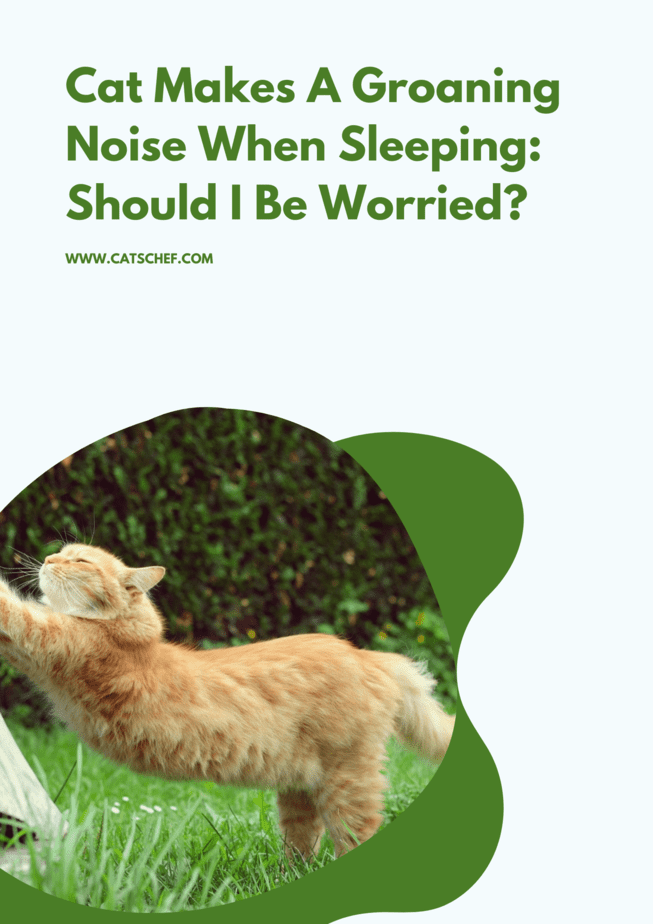📖 Table of Content:
“So, I heard something strange while I was sleeping the other night. I was awakened by a sound that resembled the one a chainsaw would make, coming from a distance. I was sure I was being haunted by a ghost of someone I irritated while they were alive. But, as it turns out, my cat makes a groaning noise when sleeping!”
What a horror of a night for anyone that’s never had to deal with a cat’s attention-seeking behavior, right? Cats are notorious for their reserved demeanor. They’re the precious purrincesses of the animal kingdom that never descend to the level of those that can’t control their emotions (ahem, dogs, ahem).
Cats don’t race to the door the moment that your (absolutely adorable) neighbor rings the bell. They don’t bark your ears off because they hear the sound of clunks from the mailman’s bike’s chains. And, they don’t grumble the day away while watching the blameless passers go about their day.
But, that’s not to say that cats don’t make sounds that can wake you up at 5 a.m. (especially when you’re trying to get your beauty sleep for a really, really important meeting). As a matter of fact, cats can be as chatty as they want to be with the widest range of vocalizations among the domesticated bunch.
So, the meowing, the purring, the hissing, the growling, and the groaning might be some of the sounds you go to sleep with at night and wake up to in the morning. And, we can’t even mention other attention-seeking behavior our furry friends employ because we have to focus on what you came here for.
Now, you say your cat makes a groaning noise when sleeping? Here’s what to keep an eye out for before you draw your own conclusions.
Cat communication – Why do cats produce strange sounds at night?
Cats aren’t nocturnal, contrary to what a lot of pet parents might think! When you ask them why their fluffy friend keeps meowing and groaning during the night, they often defend them by saying something along the lines of “Oh, she’s nocturnal! She can’t help but have her way during the night!”
While it’s true that cats might prefer the nighttime, they’re actually crepuscular, which means they’re most active at dawn and dusk. They tend to rest during the day (which would explain why your four-legged friend spends her day lounging on the sofa and watching reruns of Friends).
Now, why do cats produce strange sounds at night? First things first, cats are more active at night because of the whole “nocturnal/crepuscular” thing. They prefer playing, exploring, munching, and scratching while everyone’s sleeping.
On the other hand, cats produce strange sounds at night because they trying to get your attention. They don’t like the fact that you’re sleeping while they’re having that much fun (that TikTok that goes “At this time you are sleeping? It’s not possible!” comes to mind, but go off).
And, don’t even get me started on the fact that cats get hungry at the weirdest of hours! Who taught them that 5 a.m. was an appropriate time for breakfast!? Nobody’s serving them Fancy Feast at that time because nobody’s awake. But, that doesn’t stop your furry friend from trying to wake you up.
Last but not least, cats produce strange sounds because they’re stressed out, marking their territory, or looking for a mate. “But, why does my cat make a groaning noise when sleeping?” Get your pen and paper because we’re bringing you a list of reasons that might help you understand your cat better!
Why does my cat make a groaning noise when sleeping?
1. She’s dreaming
Oh boy, you must have (at some point in your parenthood) thought that your fluffy friend was having a dream because she was twitching, twirling, and groaning the night away. And, you must have spent the following morning typing “Do cats have dreams? Why does my cat make a groaning noise when sleeping?”
And, you weren’t wrong for assuming that because cats can have dreams! That might come as a surprise to humans who have never fostered or parented a fluff. But for the others, the nighttime behavior might have been a giveaway. That’s right; cats don’t behave that way for laughs and giggles (hmm, some do!)
Cats dream the same way humans do. They dream about munching on paw-licking chicken wings, running through a field chasing after chickens, and snuggling with other fluffy friends. Cats don’t dream regularly, but when they do they’re typically producing a bunch of sounds that might freak you out.
2. She’s not groaning, she’s snoring!
“Humans snore. Dogs snore. I’ve never heard that cats can snore, too!” And there’s nothing wrong with that because not every cat snores anyways. But, you shouldn’t rule out the pawsibility that you’re hearing those groaning noises at night because you’re furry friend seems to be snoring her little heart out.
“But, why do cats snore? Snoring isn’t necessarily a healthy occurrence among humans which makes me wonder whether it’s something I should keep an eye out for?”
That’s right! While you might be pleased that your feline friend doesn’t seem to be summoning the spirits of the dead during the night, you might not be as pleased to learn why.
As a matter of fact, she might be suffering from a bunch of health problems without you even knowing. Brachycephalic breeds have teeny tiny noses that make breathing a difficult task, for example. Obese cats deal with a similar problem with the weight putting pressure on the nasal passage. Not to mention the wrong sleeping positions!
3. She’s caterwauling
“What on Earth’s that?!” You’re probably more than familiar with your cat’s regular meows and purrs that scream “Give me a bite of that hamburger right meow!”, or “Snuggle with me before I get annoyed and scratch your eyes out!”, or even “My tummy hurts, take me to the vet as soon as you can!”
Our four-legged friends are pretty great at vocalizing their needs, as long as you can decipher what they were trying to say. And, for the most part, deciphering their regular cat communication methods doesn’t make you contact an animal behaviorist and cry for help. But, what about caterwauling?
Caterwauling’s a term used for high-pitched, bizarre sounds our furry friends make when they’re trying to communicate. And, they caterwaul for a bunch of reasons.
They’re uncomfortable, they’re looking to mate, they’re overwhelmed, AND they want your attention. Your little fluff might not be groaning; she might be caterwauling!
4. She’s bored
Aren’t we all!? Anyway, your precious purrincess might not appreciate your nighttime routine as much as you thought. And, she might spend most of the time trying to get your attention by meowing, purring, and groaning your ears off. Adorable, but not as much when you realize you have a meeting at 6 a.m., right?
Actually, she might not be bored during the night as much as she’s bored during the day. Bear with me on this one. When your furry friend tries her best to stay awake during the day because she doesn’t know what to do with herself, she might become more and more tired, depressed, and lethargic.
As a result, she might even gain weight and become obese. What does that have to do with making groaning sounds while sleeping? Everything!
Not only does this make your furry friend lose the ability to sleep through the night, but the weight causes pressure on her body which makes her snore and produce different sounds.
5. She’s stressed, overwhelmed, and/or disoriented
“Why does my cat make a groaning noise when sleeping? She’s been under a lot of stress lately because she’s been dealing with health problems, and we feel as though she hasn’t bounced back, yet.” Does that sound like something your feline friend’s going through at the moment? We’ve got some news for you, buddy!
That’s right; cats can make different sounds while they’re sleeping (or while they’re awake) because they don’t really know how else to communicate what they’re going through. Cats make sounds when they’re happy or sad, when they’re tired or energized, and even when they’re stressed or satisfied.
There’s no rule when we’re talking about cat communication methods. You can figure out whether your cat’s stressed out, overwhelmed, or disoriented by observing everything else that’s going on while she’s sleeping (a new cat, an uncomfortable bed, loud sounds coming from the outside…).
What do you do when that happens? Pamper your purrincess! Make her feel loved by giving her endless hugs and kisses. Make her feel appreciated by surprising her with cat food and cat treats (or even that toy she’s been obsessing over every time you go to PetSmart). And, make her feel safe by snuggling with her at night.
6. She’s uncomfortable and/or in pain
Now, this one’s incredibly important to keep an eye out for. You might think your curious creature’s messing with your sleeping schedule on purpose. You might even think she’s making those demon sounds because she’s got a bone to pick with you. But, what IF she’s uncomfortable and/or in pain?
Cats do have a hisstory (pun intended) of making sounds to signal that they’re hurt, chased, or something even worse than that. So, your cat might be making those sounds because she’s experiencing health problems and complications you might not have noticed beforehand.
“She does seem to refuse food more frequently than before. And, she does seem to spend a lot of time in and out of her litter box.” And there you go!
On the off chance that your cat’s been dealing with discomfort for a while, you might have noticed a couple of other symptoms pointing towards a disease. A liver disease, maybe? Or an infection? Contact your vet and find out!
7. She’s asking for attention
Again, aren’t we all!? Now, you might be thinking to yourself “Cats are the least attention-seeking animals out there. They don’t care whether you live or die; as long as you feed them on time and let them do whatever they want, they’re happy!” That’s right, but there’s always a little but lingering over our heads.
But cats love to cuddle and snuggle under the condition that you stop as soon as they’re done. But cats love to let out the loudest meow they can when they’re begging you to share a bite of your food with them. Oh, but cats love to scratch your eyes out when they’re showing you the whole “tough love” thing.
Kidding aside, cats don’t mind asking for attention when they want attention. Your cat makes a groaning noise when sleeping because she wants you to wake up and pet her. Since she’s already sound asleep, she can’t move a paw. Make sure you provide her with plenty of play time while she’s awake and voilà!
8. She’s marking her territory
Cats mark their territory for a bunch of reasons! Maybe your furry friend’s stressed out and she’s looking to take some of that stress out on you. Maybe she’s making sure that the kitten you decided to bring home from work one day knows who’s the boss. Or, maybe she’s claiming you as one of her own.
Whatever the case might be, you’ve never heard that a cat can mark her territory by making different sounds. You’ve heard of the “urinating everywhere and on everything,” kneading and pawing, headbutting, and even licking as a form of letting everyone know “This here thing? That’s mine!”
But, that’s not the only thing your feline friend does when she’s marking (and protecting) her territory. Aggressive behavior (groaning, growling, and hissing) signifies that your cat doesn’t want other animals coming anywhere near you or your house. And, yes, such behavior can happen when she’s sleeping, too!
9. She wants to meet a mate!
“Why does my cat make a groaning noise when sleeping? Actually, she makes the same noise when she’s going about her day, lunging on the bed, or even munching on Fancy Feast. Why does she do that?” Cats that haven’t been neutered or spayed tend to vocalize their need for a mate.
Female cats get super, super loud when they’re in heat because they’re trying to attract a male. And, as it turns out, male cats get as loud when they sense a female cat anywhere near them.
Suddenly, you might start hearing a bunch of groaning, growling, and howling coming from every cat in the neighborhood. That’s how they operate!
But, that’s not necessarily a cause for concern. There’s nothing wrong with your mischievous monster wanting to mate as long as that’s something you’re comfortable with.
Consult with your vet and check what the best way to do that safely would be. Other than that, check what the best option to get your cat neutered or spayed would be!
10. She’s dealing with separation anxiety
We’ve touched upon the fact that cats can feel stressed, anxious, and overwhelmed which can cause those groaning noises while they’re sleeping. But, we haven’t mentioned the fact that cats can make the same noises when they’re dealing with separation anxiety – separation from you or their mother, depending on the case.
First things first, kittens that have been separated from their mother early on might face difficulty sleeping without you. That’s especially noticeable when they’ve spent some time sleeping on your bed before you try to get them to sleep on their own.
They might moan and groan because they’re trying to get your attention and check whether you’re there.
On the other hand, grown cats can get separation anxiety when they move to a different house, when you (or whoever’s taking care of them) go away, or even when you take away their favorite toy. Depending on the trauma they’ve been through, cats can get separation anxiety for the most minuscule of reasons.
When does the whole “groaning when sleeping” predicament become a problem?
“My cat makes a groaning noise when sleeping and I’m wondering when should I schedule an appointment with my vet?!” Here’s the thing, you have nothing to worry about as long as your beautiful beast’s producing strange sounds because she’s looking for attention or begging you to feed her.
But, we can’t say that there aren’t situations when you should get your vet on the phone. Strange sounds alone don’t mean anything. But, when they’re accompanied by discomfort, appetite fluctuations, depression, respiratory problems, and/or discharge from different orifices… they mean something’s wrong.
These symptoms might point to heart disease, respiratory disease, liver disease, asthma, or even dental disease. Make sure to contact your vet the moment that you notice any of these symptoms. And, don’t forget the mention the strange sounds – they might help your vet diagnose your cat.
How to stop your cat from making a groaning noise when sleeping?
We love our fluffy friends to death. But, we have to face the fact that there are times when we can’t deal with the constant meowing, the groaning, and the waking up. We have to put ourselves first (another TikTok sound!) and we have to teach them how to sleep through the night without turning into Banshees.
And, how do we do that? First things first, you have to figure out why your feline friend’s groaning at nighttime. You can’t address the problems before you make sure she’s groaning because she’s asking for attention, because she’s having a nightmare, or even because she’s experiencing health problems.
When you do that, you can start working on getting her used to a different nighttime routine. What do we mean by that?
For example, when your cat’s groaning because she’s hungry make sure you start feeding her later each evening. Or, when she’s groaning because she’s bored make sure you keep her awake during the day.
Or even, when she’s groaning because she’s experiencing health problems get her the help she needs (whether we’re talking about stress and anxiety or physical ailments). And, don’t forget to turn a deaf ear to the groaning; you don’t want to accidentally reinforce the attention-seeking behavior. Good luck!
